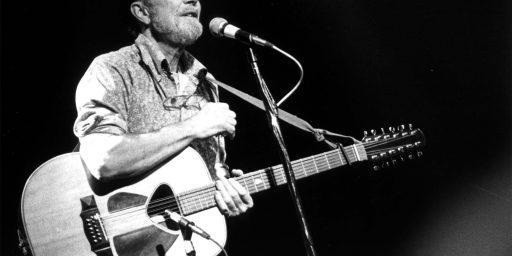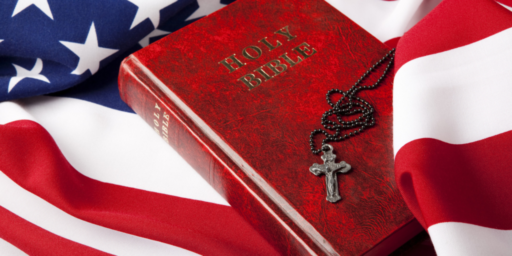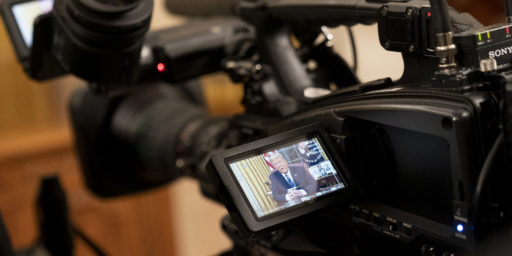Liberal Evangelicals?
Ayelish McGarvey has an interesting piece in the current American Prospect.
Meet the “freestyle evangelicals.” Compelled by evangelicalism’s conservative theology but averse to the right wing’s intolerance and lack of charity toward the poor, they occupy a curious political middle ground. Every four years they independently evaluate the state of the union through the lens of a Jesus-centered faith. But their concerns extend beyond the conservative morality issues of abortion and gay marriage to progressive matters of social justice, America’s role in the world, and care for the environment. The sociologist Stephen Hart describes Christian faith as comprising a set of elemental moral “building blocks” that believers “assemble” in countless combinations to construct their social ethics. Freestyle evangelicals have neither an exclusively Democratic nor Republican worldview; they say they often find themselves in the tiresome position of electing officials who will do the least amount of damage rather than the most good. As one believer told the Prospect, “I am a political moderate, not despite my theological conservatism but because of it.”
The Bush presidency’s extremism has left many moderate believers looking to the Democrats. Jim Wallis is a progressive evangelical and editor of Sojourners magazine. In a December New York Times op-ed, he challenged Democratic presidential contenders to charge fearlessly onto the moral high ground. “How a candidate deals with poverty is a religious issue, and the Bush administration’s failure to support poor working families should be named as a religious failure,” he wrote. “Neglect of the environment is a religious issue. Fighting pre-emptive wars based on false claims is a religious issue.
***
Freestyle evangelicals — the term was recently coined by Steven Waldman, editor of the interfaith Web site Beliefnet — defy the conventional wisdom about fundamentalist Christians. They are mostly white suburbanites in the South, Midwest, and Northwest. Many attend nondenominational megachurches, and their children go to public schools. They number between 8 million and 10 million and comprise 30 percent to 40 percent of the total evangelical vote — roughly the same number as the most hypertraditional evangelicals, the core of the Christian right.
It’s certainly true that a large number of religious folk, including Southern religious folk, are Democrats and even liberal on many social issues. But calling these people “evangelicals,” freestyle or otherwise, confuses the issue. Calling them “fundamentalist” is simply wrong.
If one spends a few minutes looking around the Sojourners Magazine website, it’s rather clear they are neither fundamentalist nor, in any but the most vague sense, evangelical. It seems a rather ecumenical blend of Episcopaleanism and the more liberal variants of Methodism and Prebyterianism. Those traditions have long roots in the liberal Southern tradition and are certainly well represented, especially among the professional classes. Most of the people I encountered in the Rotary and Kiwanis Clubs, the boards of Habitat for Humanity, and similar organizations in Alabama were of this persuasion. They’re upstanding folks who are precisely not evangelical, preferring to keep their religiousity private and let their faith show instead in good works.






This article just shows how ignorant most media folks are about religion. The “Religious Right” is the boggeyman so everything else is defined in relationship to that despite the fact it makes no sense. It is perfectly possible to be a evangelical liberal or leftist. I know a number of them myself.
I wonder how conservative their theology would be? There is no mention of a belief in the full truthfulness of the Bible, or the “hard sayings” of the new testament. What kind of “evangelism” qualifies them as “evangelicals?”
Hi there — I can tell you, calling us “evangelicals” is precisely right. (I was one of the subjects of McGarvey’s piece.) And from friends in Sociology, I can tell you that what McGarvey reports about swing votes in the “evangelical” crowd is also precisely correct in its terminology. See here:
http://www.amazon.com/exec/obidos/tg/detail/-/0520234707
I am pretty conservative theologically, and my denominational background includes Church of Christ (my parents), then E. Free, Bible churches, and an independent church in the Baptist tradition.
I agree the article seems to point out what is obvious to many of us. But as the 60 Minutes piece shows, it needed to be written, because the obvious is not obvious to everybody.
all good wishes,
J.
—